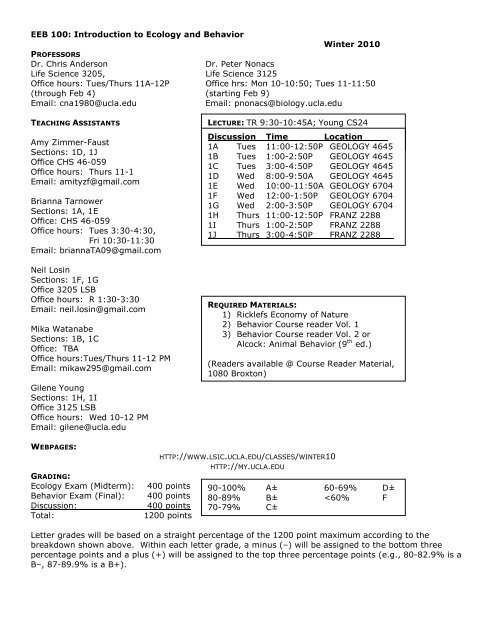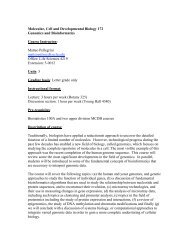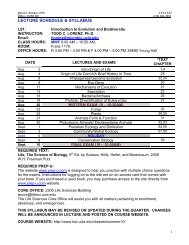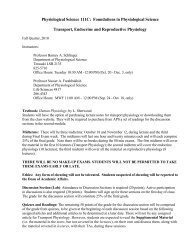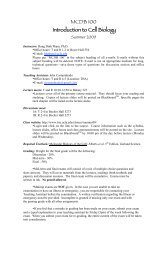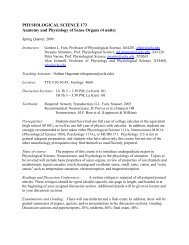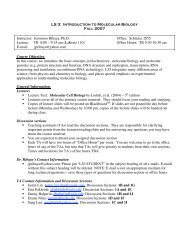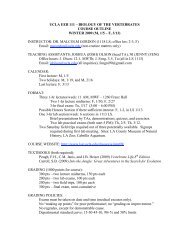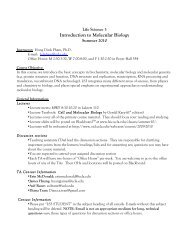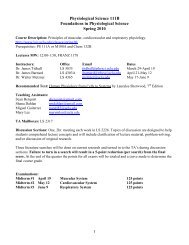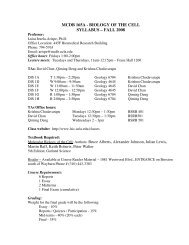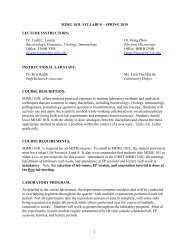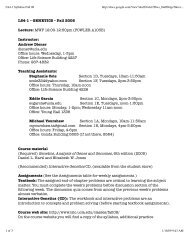Syllabus - UCLA
Syllabus - UCLA
Syllabus - UCLA
You also want an ePaper? Increase the reach of your titles
YUMPU automatically turns print PDFs into web optimized ePapers that Google loves.
EEB 100: Introduction to Ecology and Behavior<br />
Winter 2010<br />
PROFESSORS<br />
Dr. Chris Anderson<br />
Dr. Peter Nonacs<br />
Life Science 3205, Life Science 3125<br />
Office hours: Tues/Thurs 11A-12P Office hrs: Mon 10-10:50; Tues 11-11:50<br />
(through Feb 4) (starting Feb 9)<br />
Email: cna1980@ucla.edu<br />
Email: pnonacs@biology.ucla.edu<br />
TEACHING ASSISTANTS<br />
Amy Zimmer-Faust<br />
Sections: 1D, 1J<br />
Office CHS 46-059<br />
Office hours: Thurs 11-1<br />
Email: amityzf@gmail.com<br />
Brianna Tarnower<br />
Sections: 1A, 1E<br />
Office: CHS 46-059<br />
Office hours: Tues 3:30-4:30,<br />
Fri 10:30-11:30<br />
Email: briannaTA09@gmail.com<br />
Neil Losin<br />
Sections: 1F, 1G<br />
Office 3205 LSB<br />
Office hours: R 1:30-3:30<br />
Email: neil.losin@gmail.com<br />
Mika Watanabe<br />
Sections: 1B, 1C<br />
Office: TBA<br />
Office hours:Tues/Thurs 11-12 PM<br />
Email: mikaw295@gmail.com<br />
Gilene Young<br />
Sections: 1H, 1I<br />
Office 3125 LSB<br />
Office hours: Wed 10-12 PM<br />
Email: gilene@ucla.edu<br />
LECTURE: TR 9:30-10:45A; Young CS24<br />
COURSE WEBSITE:<br />
Discussion Time Location<br />
http://www.lsic.ucla.edu/classes/fall08<br />
1A Tues 11:00-12:50P GEOLOGY 4645<br />
1B Tues 1:00-2:50P GEOLOGY 4645<br />
1C Tues 3:00-4:50P GEOLOGY 4645<br />
1D Wed 8:00-9:50A GEOLOGY 4645<br />
1E Wed 10:00-11:50A GEOLOGY 6704<br />
1F Wed 12:00-1:50P GEOLOGY 6704<br />
1G Wed 2:00-3:50P GEOLOGY 6704<br />
1H Thurs 11:00-12:50P FRANZ 2288<br />
1I Thurs 1:00-2:50P FRANZ 2288<br />
1J Thurs 3:00-4:50P FRANZ 2288 _<br />
REQUIRED MATERIALS:<br />
1) Ricklefs Economy of Nature<br />
2) Behavior Course reader Vol. 1<br />
3) Behavior Course reader Vol. 2 or<br />
Alcock: Animal Behavior (9 th ed.)<br />
(Readers available @ Course Reader Material,<br />
1080 Broxton)<br />
WEBPAGES:<br />
GRADING:<br />
Ecology Exam (Midterm):<br />
Behavior Exam (Final):<br />
Discussion:<br />
Total:<br />
HTTP://WWW.LSIC.<strong>UCLA</strong>.EDU/CLASSES/WINTER10<br />
400 points<br />
400 points<br />
400 points<br />
1200 points<br />
HTTP://MY.<strong>UCLA</strong>.EDU<br />
90-100% A± 60-69% D±<br />
80-89% B±
EEB 100: Introduction to Ecology and Behavior<br />
Winter 2010<br />
EXAMS: The Midterm and Final will be a combination of multiple choice, T/F, written answer, and<br />
problem solving. You must be on time for the exam. Anyone arriving after another student has left will<br />
not be allowed to take the exam. They will be partially open-note. You will be allowed to bring one 8” x<br />
11” piece of paper on which you can write any information you consider relevant or helpful for doing well<br />
in the exam. You may work with others to study and discuss material to put on the sheet, but you<br />
cannot directly copy other’s sheets. No calculators allowed for the midterm. The Final will be identical to<br />
the midterm in length, and will cover only the last half of the course. Calculators are allowed for the final.<br />
DISCUSSION: A large amount of your grade is the discussion section, where you will be part of a<br />
discussion group of 4-5 students in addition to the larger section. As a result, you must attend section<br />
and be on time. There are no make-ups or extra credit work. If you miss a section where another<br />
assignment is to be turned in (e.g., field notes, the prospectus), you should turn that in on time or early<br />
for full credit.<br />
If you miss a section and wish to go to an alternate section to learn the material (but not receive points),<br />
you must get permission from the TA running that section beforehand. No crashing sections. The TA has<br />
the right to refuse attendance, based on how full their section is and whether others have already<br />
requested permission to attend.<br />
Please check the syllabus carefully to make sure you do not have a scheduling conflict with the test<br />
dates. No make-up tests or extra credit assignments will be given.
EEB 100: Introduction to Ecology and Behavior<br />
Lecture<br />
Date<br />
Jan 5<br />
Tues<br />
Jan 7<br />
Thurs<br />
Jan 12<br />
Tues<br />
Jan 14<br />
Thurs<br />
Jan 19<br />
Tues<br />
Jan 21<br />
Thurs<br />
Jan 26<br />
Tues<br />
Jan 28<br />
Thurs<br />
Feb 2<br />
Tues<br />
Feb 4<br />
Thurs<br />
Feb 9<br />
Tues<br />
Feb 9<br />
Tues<br />
Feb 11<br />
Thurs<br />
Feb 16<br />
Tues<br />
Feb 18<br />
Thurs<br />
Feb 23<br />
Tues<br />
Feb 25<br />
Thurs<br />
Mar 2<br />
Tues<br />
Mar 4<br />
Thurs<br />
Mar 9<br />
Tues<br />
Mar 11<br />
Thurs<br />
Mar 16<br />
Tues<br />
Lecture Schedule<br />
Winter 2010<br />
# Topic Reading<br />
1 Intro to Ecology: Global ecosystems<br />
Ricklefs Ch. 4 pp 64-<br />
78<br />
2 Populations: Single species Ricklefs Ch 11<br />
3 Populations: Interspecific Interactions 1 Ricklefs Ch. 14 & 16<br />
4 Populations: Interspecific Interactions 2 Ricklefs Ch. 15<br />
5 Disturbance and Succession<br />
Ricklefs Ch. 19 pp<br />
393-406<br />
6 Biodiversity Ricklefs Ch. 20<br />
7 Metapopulations and Dispersal Ricklefs Ch. 12<br />
8 Shifts, Declines & Extinction<br />
Townsend et al. Ch.<br />
14<br />
9 Dispersal & Disease Ricklefs Ch 10<br />
10 Global Climate Change & Applied Ecology Ricklefs Ch. 10 & 15<br />
11<br />
12<br />
13<br />
14<br />
15<br />
16<br />
17<br />
18<br />
19<br />
20<br />
MIDTERM EXAM<br />
6:00 pm-9:00 pm (Room TBA)<br />
Natural Selection, adaptation and genes Behavior Reader<br />
(Nonacs)<br />
(BR), v1 #1 and #2<br />
Levels of analysis; Instinct versus learning BR v2 #3 or Alcock<br />
Ch 2, pp 28-35, 43-<br />
53; BR v1<br />
#4(optional)<br />
Sexual dimorphism BR v1 #5<br />
Sexual selection BR v1 #6 (note –<br />
there are 2 papers<br />
here)<br />
Mate choice and mating systems<br />
BR v2 #7 or Alcock<br />
Ch 11<br />
Social behavior<br />
BR v2 #8 or Alcock<br />
Ch 13<br />
Kin selection BR v1 #9 (note –<br />
there are 2 papers<br />
here)<br />
Parental care<br />
BR v2 #10 or Alcock<br />
Ch 12, pp 421-433,<br />
444-449<br />
Predation and looking for food BR v1 #11<br />
Optimal foraging<br />
FINAL EXAM<br />
11:30 AM-2:30 PM (Room TBA)<br />
BR v2 #12 or Alcock<br />
Ch 14 pp: 507-520<br />
(required); 521-545<br />
(optional)
EEB 100: Introduction to Ecology and Behavior<br />
Winter 2010<br />
COURSE POLICIES<br />
STUDY TIPS: Although the tests may include any material covered in lecture, discussion or the assigned<br />
readings, you should pay special attention to the lecture material. The emphasis of the tests will be on<br />
concepts (theories) and scientific approaches (methods). You will encounter many terms in this course<br />
that have both common and scientific meanings. It is very important that you learn the scientific<br />
definitions of these terms, as given in lecture or the assigned readings. In general, you will not be<br />
expected to learn the names of scientists mentioned in lecture, but you should be familiar with the names<br />
of people associated with major conceptual advances (e.g., Connell, Darwin, Hamilton). One of the best<br />
ways to study for this course (and others like it) is to convert your lecture and reading notes into a series<br />
of questions and write the answers down separately (e.g., on opposite sides of the same page) in your<br />
own words. When studying, try to answer the questions again but without looking at the answers. Rote<br />
memorization will not serve you very well in this course.<br />
DROPPING THE COURSE: If you decide to drop this course, do not wait until the last minute to try and get<br />
our signatures - do not wait until after the final exam. Please be aware that you must not complete the<br />
course in any way (i.e., take the final) if you wish to have a restricted late drop.<br />
POLICY ON LATE ASSIGNMENTS: To be fair to your fellow students, late assignments will lose 10% of their<br />
point value each day they are late. This penalty includes weekends and holidays and begins accruing<br />
immediately after papers are collected. Please hand in your assignments when they are due to avoid<br />
penalties. This INCLUDES electronic copies submitted to Turnitin.com (see below).<br />
CHEATING, PLAGIARISM, AND TURNITIN.COM: Any student caught cheating or plagiarizing will be given zero<br />
points for that test or paper and reported immediately to the Dean’s Office for disciplinary action. We<br />
keep copies of papers from past years on file and we will use the document checking service,<br />
Turnitin.com. We will review in class what constitutes plagiarism, but you should also read the<br />
information provided at the following web sites:<br />
http://www.library.ucla.edu/bruinsuccess/<br />
http://www.tunitin.com/research_site/e_home.html<br />
http://owl.english.purdue.edu/handouts/research/r_plagiar.html<br />
http://www.indiana.edu/~wts/pamphlets.shtml<br />
For the Final Paper you have to provide both a hardcopy version of your paper AND submit an electronic<br />
version to Turnitin.com. Failure to do both on-time will result in losing points as outlined above. When<br />
you turn in your hard copy, you MUST include a printout of the Originality Report from Turnitin.com. It<br />
can take up to 24 hours for the site process a paper so plan your time accordingly.<br />
Keep in mind the following points when using Turnitin.com:<br />
1. Upload only the final text of your paper, without the references section. Turnitin.com only allows one<br />
submission per assignment. The graders will compare your hardcopy paper to your Turnitin.com<br />
submission. Substantive differences in the text will make your paper unacceptable.<br />
2. Be sure to include references in the hardcopy version.<br />
3. If you encounter difficulties submitting to Turnitin.com, try: (i) Uploading several times (sometimes<br />
the problem will go away); or (ii) Switch computers and try again. It is your responsibility to make us<br />
aware of any problems before the assignment is due. Thus, it is to your great advantage not to wait<br />
until the last possible moment to submit


